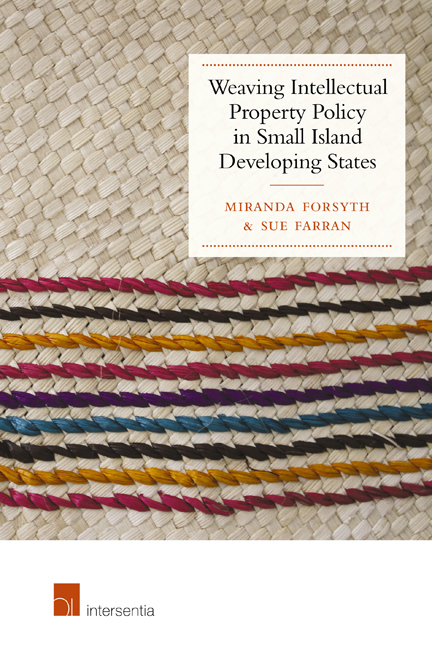Book contents
- Frontmatter
- Dedication
- Acknowledgements
- Contents
- List of Tables
- Introduction
- Chapter 1 Intellectual Property and Development: The Issues Viewed through a Pacific Islands Prism
- Chapter 2 Health and Issues of Access to Medicine
- Chapter 3 Access to Educational Resources
- Chapter 4 Problems with Importing the Global Intellectual Property Regime into Pacific Island Countries: Learning from Land
- Chapter 5 Setting Out a New Approach to Intellectual Property and Development
- Chapter 6 Intellectual Property and Technological Innovation in Pacific Island Countries: The Example of Sustainable Sea Transport
- Chapter 7 Branding, Certifying and Authenticating in Pacific Island Countries
- Chapter 8 The Regulation of Traditional Medicinal Knowledge in Pacific Island Countries
- Conclusion
- About the Authors
Chapter 8 - The Regulation of Traditional Medicinal Knowledge in Pacific Island Countries
Published online by Cambridge University Press: 22 November 2017
- Frontmatter
- Dedication
- Acknowledgements
- Contents
- List of Tables
- Introduction
- Chapter 1 Intellectual Property and Development: The Issues Viewed through a Pacific Islands Prism
- Chapter 2 Health and Issues of Access to Medicine
- Chapter 3 Access to Educational Resources
- Chapter 4 Problems with Importing the Global Intellectual Property Regime into Pacific Island Countries: Learning from Land
- Chapter 5 Setting Out a New Approach to Intellectual Property and Development
- Chapter 6 Intellectual Property and Technological Innovation in Pacific Island Countries: The Example of Sustainable Sea Transport
- Chapter 7 Branding, Certifying and Authenticating in Pacific Island Countries
- Chapter 8 The Regulation of Traditional Medicinal Knowledge in Pacific Island Countries
- Conclusion
- About the Authors
Summary
INTRODUCTION
This chapter advances the arguments already made about the benefits of a contextually grounded and pluralist approach to intellectual property regulation through examining the regulatory framework around traditional medicinal knowledge and associated plants in Pacific island countries. As discussed in Chapter 2, there is a long and vibrant use of traditional medicine in Pacific islands countries, and it continues to play an important role in healthcare in almost every part of the region today, as well as among the Pacific diaspora. Besides raising regulatory issues concerning safety standards and appropriate pathways between western and traditional medicine, the practice of traditional medicine poses a number of particular intellectual property related issues. These can be grouped into three broad categories, which indeed largely mirror the issues surrounding many other types of traditional, local or indigenous knowledge. The first relates to concerns about misappropriation of the knowledge by outsiders through the development of a new medicinal products and the resulting exclusion of the knowledge holders from the resulting commercial benefits usually through the use of patents. The second relates to finding ways in which traditional medicinal knowledge can be used to generate economic benefits for the source community; and the third relates to ensuring that the knowledge and the plants and other natural resources that it is dependent upon are nurtured and valued sufficiently for active inter-generational transfer. In this chapter we will first examine how these three different sets of issues are currently being expressed in Pacific island countries, with a particular focus on traditional medicinal knowledge. We will then discuss some of the actual and proposed regulatory responses to deal with these challenges. In the conclusion we will draw upon the insights from the case studies to make a number of observations about how a pluralistic approach to regulation in this area may be of assistance, and the need to take into account the social, economic and political contexts of the particular communities and countries being regulated. We also demonstrate how different regulatory orders (for instance state and non-state) permit and foreclose different levels of agency, empower different stakeholders, reflect different institutional realities and draw upon varying underlying values and principles.
- Type
- Chapter
- Information
- Publisher: IntersentiaPrint publication year: 2015



